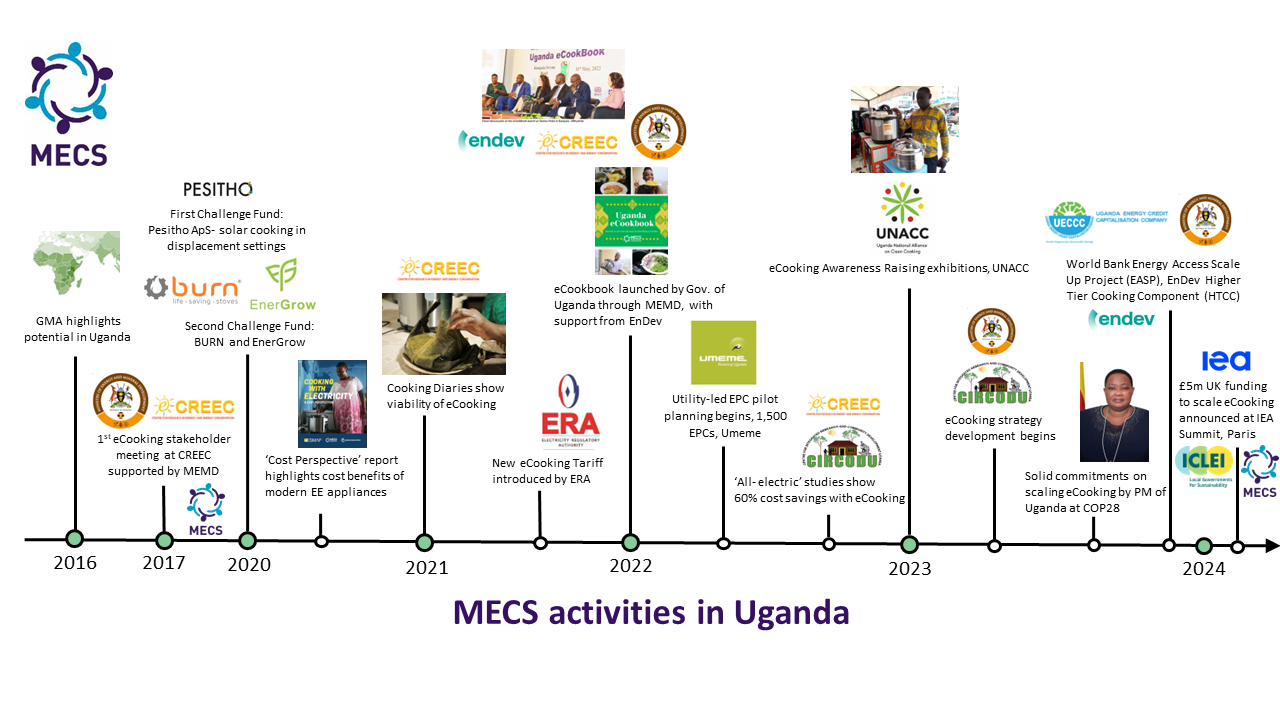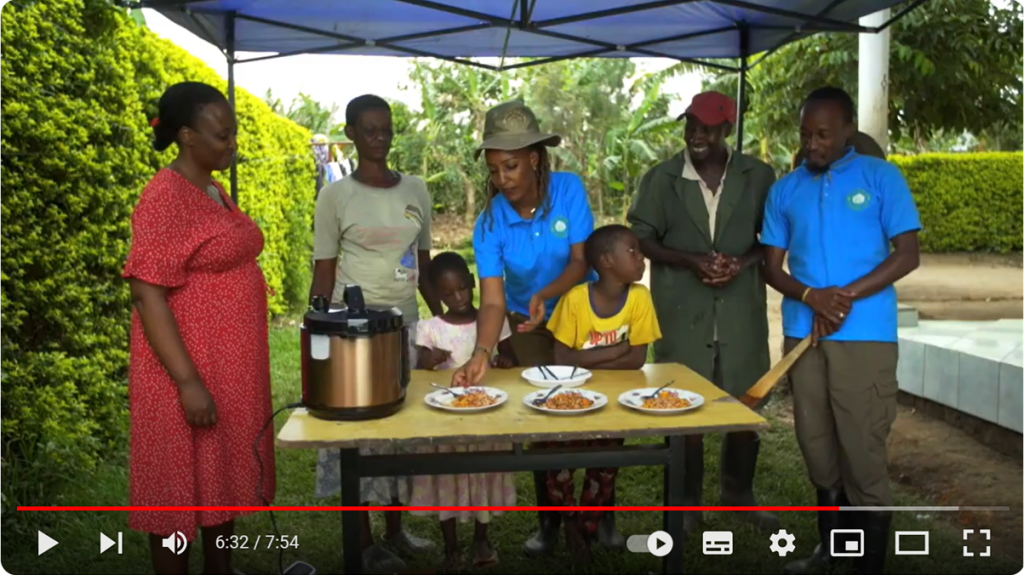
- Date
- 30th May 2024
- Categories
- Clean Cooking, eCooking
By Dr Will Clements, Gamos Ltd.
Uganda has emerged as an inspiration to other countries in its efforts towards enabling increased adoption of modern energy cooking, with key players working hard to realise high ambitions, from government actors including the Ministry of Energy and Mineral Development (MEMD) and Electricity Regulatory Authority (ERA), to the utility (Umeme), research organisations (CREEC, CIRCODU), the Uganda National Alliance on Clean Cooking (UNACC) and private sector players such as PowerUP, UpEnergy, EnerGrow, WANA Energy Solutions, Eco Stoves Uganda, and many more.
The timeline above highlights key moments and milestones in Uganda’s modern energy cooking journey – the ones we know of; we are sure there are others. Starting in 2016, the Global Market Assessment (GMA) for electric cooking scored Uganda highly and found that, as a large proportion of the population already pays significant amounts for charcoal, a transition to electric cooking is potentially viable, affordable and would certainly be impactful. In 2017, the first stakeholder meeting discussing these possibilities was held at CREEC, organised by MEMD.
After MECS launched in 2018, Challenge Funds enabled crucial research into electric cooking feasibility and acceptance in Uganda. Firstly, the Technology Research for International Development call (MECS -TRIID) saw Pesitho ApS investigate solar eCooking in Bidibidi Refugee Settlement in Northern Uganda with the ECOCA, finding that benefitting households remarked upon the reduced need for firewood (and its collection) and reduced exposure to smoke. Next, a partnership between BURN and EnerGrow investigated preferences and market dynamics for EPCs in Uganda and Kenya through the Electric Cooking Outreach (ECO) Challenge Fund. BURN’s findings on EPCs are comprehensively summarised in this report, where in the Kenya pilot it was found that 43% of the menu cooked with the EPC one month after purchase. 2020 also saw the release of Cooking with Electricity: A Cost Perspective which showed that eCooking was already a cost-effective option in a variety of settings and that the positive trajectory would continue.
In 2021, MECS contracted the Centre for Research in Energy and Energy Conservation (CREEC) at Makerere University as in-country partner to carry out feasibility research to assess eCooking potential in Uganda (including discrete choice modelling, cooking diaries, controlled cooking tests, policy and stakeholder research, gender analysis). Their findings showed that eCooking is a viable cooking method in Uganda, fitting to the cuisine well, saving on operational costs as compared to LPG and charcoal, and with high desirability for consumers due to time savings and health benefits.
Later in 2021, the regulator ERA built on this research by developing a cooking electricity tariff, to encourage eCooking. This tariff was designed to signal to the population that electricity is a viable and cost-effective option for cooking. By implementing this tariff, ERA aimed to dispel the notion that cooking with electricity is expensive. The following summer, the Uganda eCookbook was launched, continuing the MECS CREEC collaboration. Launched by MEMD and with support from GIZ-EnDev, the Uganda eCookbook aims to raise awareness that eCooking is the most time and cost-effective method to cook typical Ugandan dishes. MECS and EnDev Uganda also jointly developed an eCooking Market Assessment in 2022, a valuable resource covering the entire eCooking jigsaw of Enabling Environment, Consumer Demand, and Supply Chain, recommending targeted pilots, programmes and campaigns.

Late 2022 saw the beginning of planning for the utility-led EPC pilot project, which is now well underway. Funded by MECS and supported by MEMD, Umeme is distributing 1,500 EPCs in Kampala to staff and customers, partnering with Solageo, and in collaboration with CREEC and the Access to Energy Institute (A2EI). This project aims to create awareness and then demand for eCooking appliances, enabling further suppliers to enter the sector and grow their businesses, while also collecting crucial usage data and opinions on electricity costs to evaluate the eCooking tariff, which could enable creation of a more favourable environment as eCooking is scaled.
Around the same time, MECS commissioned CREEC and Centre for Integrated Research and Community Development Uganda (CIRCODU) to conduct “100% eCook” studies to understand the energy implications of cooking entirely with electricity: energy requirements, energy savings, cost implications, dish compatibility, user experience, barriers, and difficulties. The CIRCODU study further established that eCooking with efficient appliances such as EPCs and rice cookers is significantly cheaper than cooking with charcoal in households. The monthly expenditure on purchasing the main cooking fuel was reduced from UGX 135,000 to UGX 53,000 when the households cooked entirely on electricity with EPCs and rice cookers, a saving of 60%, while cost savings were also found by CREEC. Barriers identified by both organisations included unstable electricity supply in many parts of the country and EPCs on the market being of insufficient capacity to cater for large families, providing areas of focus for future work.
In 2023, MECS provided support to UNACC, an umbrella institution for clean cooking players in Uganda, to conduct awareness raising activities including clean cooking exhibitions at schools, markets, churches, banks, leading to the sales of over 500 EPCs, 50 ethanol stoves, and more. Other activities included news items on TV, radio segments, documentary production, and a media workshop to sensitise Ugandan media companies to promote modern energy cooking. MECS also collaborated with The Mediae Company, creators of a very popular TV programme on experiences of farmers in East Africa called Shamba Shape Up, on 6 segments on eCooking in Uganda, in both English and Luganda, including: how to cook tasty meat in an EPC, comparing costs of cooking fuels, EPCs and eCooking journeys, and perspectives on eCooking from Umeme. In this video, Deborah finds that cooking beans costs only 300 Ugandan shillings in an EPC and takes just 50 minutes, massive savings compared to charcoal (UGX 5,000, 3 hours) and gas (UGX 6,550, 2 hours).

Also in 2023, MECS and MEMD commissioned CIRCODU to develop a National eCooking Strategy, due to be published soon, to specify efforts and interventions to scale eCooking over the coming years, including improving the supply chain, expanding the grid, increasing awareness, integrating carbon finance, and much more. MEMD are working to create an enabling policy environment for eCooking, with support from MECS, including efforts to reduce taxes on eCooking appliances, creation of national standards and criteria for labelling and certification, and provision of accessible financing mechanisms for eCooking suppliers.
At COP28 in December 2023, the Prime Minister of Uganda Hon Robinah Nabbanja described how Uganda is working to rapidly scale eCooking, with a target now set of 18% by 2030, according to the National eCooking Strategy, in line with the ambitions of the Global eCooking Coalition (GeCCo), of which MECS is an anchor partner. The recently launched World Bank Energy Access Scale Up Project (EASP), led by MEMD and the Uganda Energy Credit Capitalisation Company (UECCC) will invest 505 million USD for grid extension and increasing electricity access over five years. Our understanding is that 92 million USD of that has been allocated for clean cooking (ICS, biogas, briquettes, ethanol, as well as LPG and eCooking), presenting a significant opportunity to provide eCooking appliances to new and existing connections, accelerating the integration of energy planning and eCooking.
EnDev Uganda’s Higher Tier Cooking Component (HTCC) Uganda Programme was also launched in late 2023. Part of the Strengthening the Entrepreneurial Ecosystem for the Clean Cooking sector (SEE-CC) programme, the three main HTCC project activity pillars are: Pipeline Development; Access to finance and Strengthening the Enabling Environment. HTCC Uganda aims to reach 12,000 households or 60,000 beneficiaries with higher-tier cooking technologies whilst supporting interventions across the entire value chains. An RBF Facility will provide financial subsidies to companies operating across Uganda that procure large quantities of high quality, low emissions, and energy efficient cookstoves such as electric pressure cookers, induction stoves and Tier 3+ stoves.
Finally, the IEA Clean Cooking in Africa Summit, held on 14th May 2024, in Paris, saw the UK announcement of £8.5 million for Tanzania and Uganda by Lord Benyon (3 mins) which is the MECS demonstrator funding, a part of the Ayrton Fund. Up to £5 million was committed for Uganda, to include the expansion of a nationwide sustainable supply chain of at least 12,000 high quality eCooking appliances, unlock the potential for thousands of households to benefit from carbon finance payments, including in informal settlements, and establish a high-impact Clean Cooking Unit in Uganda’s Ministry of Energy to drive the national clean cooking ambitions.
Momentum towards improved choice of modern energy cooking services for people in Uganda is growing.
Featured Image: Uganda Timeline, Copyright of MECS Programme, 2024.